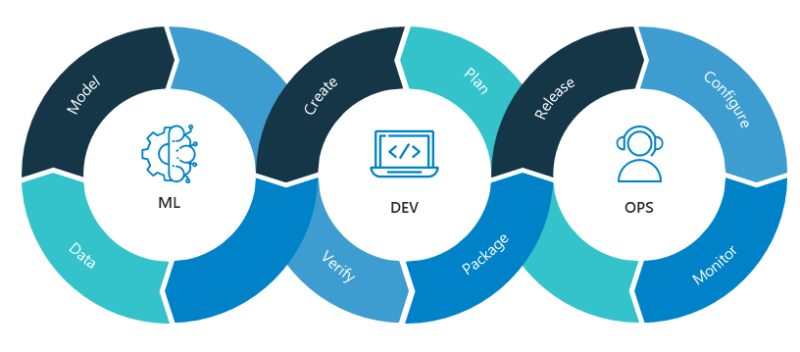Machine learning Operations (MLOps) is the process of deploying machine learning (ML) models in production. It is a collaborative function comprised of data scientists, DevOps engineers, and others. As with DevOps, the ML model goes through the steps of development, integration, testing, deployment, and monitoring. This streamlines management by automating the deployment of machine learning and deep learning models in large production systems. It is easier to align models with both business demands and regulatory standards.
- Boosts productivity
MLOps boosts data scientists’ and machine learning engineers’ productivity.
Some examples include:
- Creating automated pipelines
In ML modeling, there are numerous repetitive tasks. MLOps is an abbreviation for automating the ML model’s entire workflow. This saves time and eliminates human-caused errors. We can avoid wasting time on repetitive tasks and instead focus on tasks that add value.
- ML workflow standardization for effective collaboration
This reduces compatibility issues and speeds up the development and deployment of modeling processes.
The increase in productivity is visible both before and after implementing machine learning models. Model implementation efficiency has also increased over time as machine learning engineers become more adept at developing new models.
- Less Expenditure
There is no need to hire additional personnel to develop new versions if we only have one model. Because there is no requirement to buy additional hardware or software tools for delivering model versions, a remarkable portion of the operational costs can be averted.
It enables you to methodically identify and minimize errors. Lowering model management errors will also result in lower costs. The need for manual management of machine learning models is reduced by automation. Employee time will be freed up as a result, which could be better utilized.
- Reproducibility
The deployment of the machine learning model is more reproducible and repeatable when the ML workflow is automated. This contributes to increased productivity by shortening the time required to deploy models.
Coding automation also makes data scientists’ jobs easier. It allows humans to write code with little assistance. Furthermore, because ML retains the portions of algorithms that work, data scientists can avoid the time-consuming trial and error procedure, saving both time and money.
- Reliability
MLOps increases the reliability of ML pipelines, reduces human error, and allows us to gain real insights into the data. MLOps simplifies model management procedures for consistent scaling.
The machine learning model produced by MLOPs is highly reliable, with few errors and high quality and accuracy.
- Connectivity
MLOps allow distributed employee teams to collaborate on a common delivery model. It shortens deployment time and lowers deployment costs. Furthermore, a department or team can collect data and train new models independently. By working together on a common distribution model, all departments can share and process data more quickly and efficiently.
Because a data scientist cannot work alone to achieve MLOps goals, collaboration with others in IT and infrastructure development is essential.
Creating an integrated team ensures that the people with the necessary skills to make MLOps a success will collaborate to deliver the desired project results. It enables seamless collaboration, allowing various teams to work together to develop high-quality models.
- Monitorability
MLOps provides us with information about model performance by Continuously retraining the model to ensure the most accurate output. If there is any model drift (if the model degrades below a threshold), signals are sent. This ensures that the process adheres to regulations and that the program produces high-quality results.
MLOps principles should be implemented by any company that uses ML technology. As previously stated, MLOPs and other tools such as ModelOps can assist you in increasing your company’s efficiency. This ensures that the ML solutions you use to deliver the results you expect.













